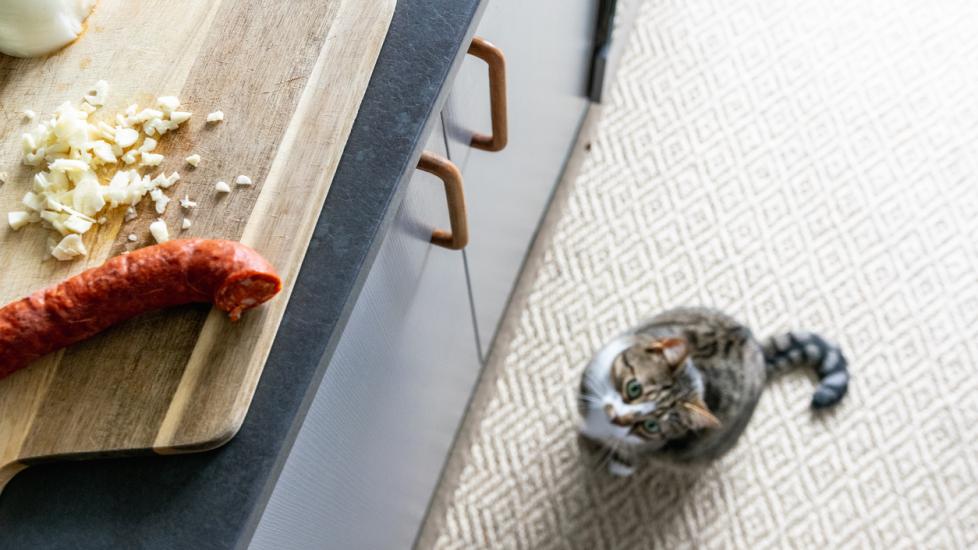Can Cats Eat Onions?
We’re all tempted to give our cats a special treat. But while some veggies and fruits are safe for cats, others can cause serious problems. Which leads us to wonder: Can cats eat onions safely?
The answer, in short, is no. Under no circumstances should a cat eat onions. Onions, along with garlic, chives, and leeks, are all in the Allium family and are poisonous to cats. And while onion poisoning occurs in dogs as well, cats are much more susceptible.
Are Onions Bad for Cats?
While a cat might bite into a raw onion, it’s more likely they will eat a food that has onions in it. Cooked onions are equally as toxic to cats as the raw onions, so keep kitty away from sauces, soups, gravy, pizza, and any other onion-containing food. Foods cooked with onion powder or dehydrated/freeze-dried onions are equally—or even more likely—to cause poisoning if ingested.
Onion toxicity causes significant stomach upset and damage to your cat’s red blood cells. This damage puts the red blood cells at risk for rupturing, causing life-threatening anemia. Red blood cells carry oxygen, and when these cells rupture, your cat has less oxygen in the body to survive. This destruction of red blood cells can also affect your cat’s lungs, liver, and kidneys.
How Much Onion Is Toxic to Cats?
Onion poisoning in cats is caused by a toxic compound in the Allium plant called N-propyl disulfide. Although any amount of onion ingestion can cause stomach upset, the most severe signs occur when more than 5 grams of onions per kilogram of their body weight, or 0.5% of their body weight in kilograms, is ingested. This is the toxic dose—however, onion toxicity has been reported in cats after ingestion of less than 1 teaspoon of cooked onions.
Something very important to consider is that onion powder is much more potent than an onion itself. Therefore, a small amount of onion powder can be toxic to cats.
For reference, one medium onion weighs about ½ pound (226 grams), which is equal to 1 tablespoon of onion powder.
Symptoms of Onion Poisoning in Cats
Onion poisoning may not be evident immediately. Symptoms can be delayed until a significant amount of red blood cells have been damaged. The onset time for developing anemia can be as soon as 12 hours after ingestion, but it’s typically delayed until two to five days after exposure.
The most common reported signs of onion poisoning in cats are vomiting, diarrhea, and lethargy, but other symptoms can include:
-
Initial non-specific signs
-
Nausea
-
Oral irritation
-
Abdominal pain
-
Vomiting
-
Diarrhea
-
-
Signs of anemia and secondary damage to liver and/or kidneys
-
Pale, yellow, blue, gray, or brown gums, and other mucous membranes in the body
-
Lethargy, depression
-
Increased heart rate
-
Increased respiratory rate (short, shallow breaths)
-
Weakness
-
Exercise intolerance
-
Dark urine
-
Yellowing of the skin and whites of the eyes
-
Collapse
-
Seizures
-
Death
-
My Cat Ate Onion. Now What?
If your cat ate an onion or a food containing onions, or even if you only suspect they did so, they should be seen by their veterinarian or an emergency veterinarian as soon as possible. The earlier medical intervention takes place, the better outcome for your cat.
It’s also recommended that you or your veterinarian call the Pet Poison Helpline at 855-764-7661 to speak to a veterinary toxicologist about how best to treat your cat’s exposure to onions. Onion poisoning in cats can be treated with prompt medical attention and intervention before too much red blood cell destruction occurs.
Treating Onion Poisoning in Cats
Onion poisoning in cats will often require your cat to remain hospitalized until all damage caused to the red blood cells has been identified and treated.
If the onion ingestion was recent (within the last two hours), your vet might induce vomiting to remove any onion left in the stomach, as well as give activated charcoal and other decontamination therapies to help reduce the amount of toxin absorbed into the bloodstream. Never induce vomiting at home unless explicitly guided to do so by a veterinarian, as it can often do more harm to your cat than good.
Your veterinarian will take frequent blood samples to check your cat’s red blood cell levels and decide if they need a blood transfusion. Other lab work, including full blood work, as well a urine sample, will be done to assess other organs such as the liver and kidneys for toxic changes.
Your cat will remain hospitalized on IV fluids and other medications to help support the gastrointestinal symptoms and/or liver condition they may have developed. Your cat might even need supplemental oxygen to support the loss of oxygen in the destroyed red blood cells.
If your cat recovers from onion toxicity, they will likely need to have their red blood cell counts monitored for a few weeks. The prognosis is relatively good for a cat with onion toxicity that obtained quick decontamination and medical attention. It’s more guarded in cats that are severely affected with anemia and liver failure, and those that do not get aggressive treatment as soon as possible.
References
A pungent poisoning: Onion toxicosis in a cat. DVM 360. Accessed May 2, 2023. https://www.dvm360.com/view/pungent-poisoning-onion-toxicosis-cat
Featured Image: iStock/portostock
